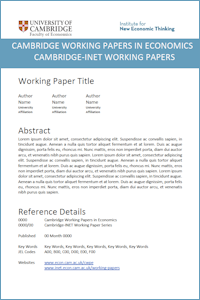
Morin, M.
The Labor Market Consequences of Electricity Adoption: Concrete Evidence from the Great Depression
CWPE1554
Abstract: When the adoption of a new labor-saving technology increases labor productivity, it is an open question whether the economy adjusts in the medium-term by decreasing employment or increasing output. This paper studies the effects of cheaper electricity on the labor market during the Great Depression. The first-stage of the identification strategy uses geography as an instrument for changes in the price of electricity and the second-stage uses labor market outcomes from the concrete industry-a non-traded industry whose location decisions are independent of the instrument. The paper finds that electricity was an important labor-saving technology and caused an increase in capital intensity and labor productivity, as well as a decrease in the labor share of income. The paper also finds that firms adjusted to higher labor productivity by decreasing employment instead of increasing output, which supports the theory of technological unemployment.
Keywords: electricity, technical change, Great Depression, labor market, employment, labor
productivity, labor share of income.
JEL Codes: J24 N12 N62 O33
Author links:
PDF: https://www.econ.cam.ac.uk/research-files/repec/cam/pdf/cwpe1554.pdf 
Open Access Link: https://doi.org/10.17863/CAM.5789
